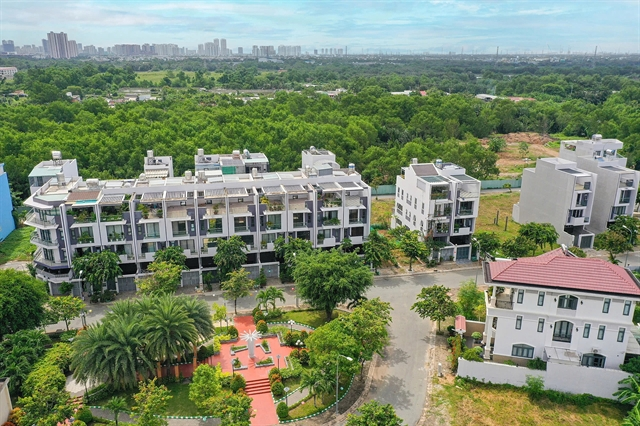Thousands of apartment owners in HCM City may finally obtain long-awaited home ownership certificates after city authorities outlined steps to resolve legal obstacles tied to an outdated housing directive abolished nearly 20 years ago.

A housing project in HCM City stalled by legal issues linked to Directive 07/2003. — Photo courtesy of DHG
The city’s Task Force 5013 has recommended issuing certificates, known locally as “red books”, for commercial housing projects left in limbo by Directive 07/2003.
The rule required developers to set aside either 10 per cent of land or 20 per cent of housing units for low-income residents.
Although repealed in late 2005, the directive still affects projects approved between 2003 and 2005, leaving buyers without legal proof of ownership despite paying in full and moving in long ago.
A red book is Việt Nam’s official certificate recognising ownership of land or housing. Without it, homeowners often cannot legally transfer or mortgage their property.
While inheritance is still possible under certain circumstances, the absence of a red book complicates ownership rights and makes transactions far more difficult, creating frustration, lawsuits, and financial losses for both buyers and developers.
Officials say the repeal of Directive 07 created three types of complications: projects where obligations were partly fulfilled but not certified, projects still under construction, and cases where developers sought to transfer their low-income housing obligations to another site.
As a result, entire housing blocks remain trapped in legal uncertainty. Residents are unable to complete paperwork, while developers face reputational damage and limited ability to launch new projects.
At the Dương Hồng residential complex in Bình Chánh District (now part of the expanded HCM City), 254 apartments were built two decades ago. Most owners have received certificates, but 25 units earmarked under the 10 per cent quota remain frozen, even though the developer says it met all obligations and sold the homes.
Lê Hoàng Châu, chairman of the HCM City Real Estate Association (HoREA), said: “This legal deadlock has left residents at a disadvantage for nearly two decades, while also damaging the reputation of developers.”
Recommendations
The task force has proposed a coordinated response. The Department of Natural Resources and Environment should reassess land valuations and calculate any extra financial obligations.
The Department of Construction should review each project under current regulations. The city’s Land Registration Office should begin issuing certificates in cases where no obligations remain.
Officials argue that unfreezing these cases will not only safeguard homeowners’ rights but also help maintain social order and prevent losses to the state budget.
According to HoREA, thousands of apartments across HCM City remain without certificates because of Directive 07.
The lack of legal recognition prevents owners from securing bank loans, selling, or passing properties to heirs.
Developers have also been hit, facing complaints, stalled projects, and reduced investor confidence.
“The consequences of Directive 07 have lingered far too long,” Châu said.
“The city must provide clear guidance to resolve these bottlenecks once and for all, instead of letting disputes drag on for nearly 20 years,” he added.
If implemented, the task force’s recommendations could deliver long-awaited relief for homeowners and bring clarity to one of the city’s most persistent real estate headaches.
Unlike in many countries where property rights are transferred at sale through title deeds, Việt Nam requires a government-issued certificate to formalise ownership.
This centralised system creates added bureaucracy that can stall transactions when policies shift, as seen with the fallout from Directive 07, which continues to entangle buyers and developers nearly two decades after its repeal.